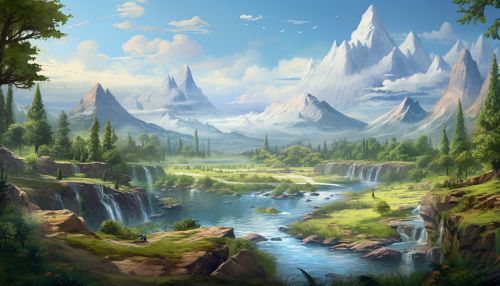Environmental Geology
Introduction
Environmental geology is a branch of geology that deals with the interaction of humans with the earth. It involves the study of natural hazards, resource management, and environmental protection. The field is highly interdisciplinary, drawing on aspects of other sciences such as biology, chemistry, physics, and geography.


Natural Hazards
Environmental geologists study natural hazards to predict and mitigate their impacts on human societies. These hazards include earthquakes, volcanic eruptions, landslides, floods, and tsunamis. The study of these hazards involves understanding the geological processes that cause them and developing strategies to minimize their impacts.
Earthquakes
Earthquakes are caused by the sudden release of energy in the Earth's crust, resulting in seismic waves that shake the ground. Environmental geologists study the causes and effects of earthquakes, as well as strategies for earthquake prediction and mitigation.
Volcanic Eruptions
Volcanic eruptions can have devastating effects on human societies, but they also play a crucial role in shaping the Earth's landscape. Environmental geologists study the processes that lead to volcanic eruptions, the hazards associated with them, and strategies for volcanic risk management.
Landslides
Landslides are a common natural hazard that can cause significant damage to infrastructure and loss of life. Environmental geologists study the factors that contribute to landslides, such as slope stability and rainfall, and develop strategies to predict and prevent landslides.
Floods
Floods are a common and destructive natural hazard. Environmental geologists study the causes of floods, such as heavy rainfall, snowmelt, and dam failure, and develop strategies for flood prediction and mitigation.
Tsunamis
Tsunamis are large ocean waves caused by underwater earthquakes, volcanic eruptions, or landslides. Environmental geologists study the causes and effects of tsunamis, as well as strategies for tsunami prediction and mitigation.
Resource Management
Environmental geologists play a crucial role in the management of natural resources, such as water, minerals, and energy sources. They study the distribution and availability of these resources, and develop strategies for their sustainable use.
Water Resources
Water resource management involves the study of water availability and quality, as well as the development of strategies for sustainable water use. Environmental geologists study the hydrological cycle, groundwater resources, and water pollution issues.
Mineral Resources
Mineral resources are non-renewable resources that are extracted from the Earth. Environmental geologists study the formation, distribution, and extraction of mineral resources, as well as the environmental impacts of mining.
Energy Resources
Energy resources include fossil fuels, such as coal, oil, and natural gas, as well as renewable energy sources, such as wind, solar, and geothermal energy. Environmental geologists study the formation, extraction, and use of energy resources, as well as their environmental impacts.
Environmental Protection
Environmental geologists also study the impacts of human activities on the environment and develop strategies for environmental protection. This includes the study of pollution, climate change, and biodiversity loss.
Pollution
Pollution is the introduction of harmful substances into the environment. Environmental geologists study the sources, distribution, and impacts of different types of pollution, such as air pollution, water pollution, and soil pollution.
Climate Change
Climate change is a long-term change in the Earth's climate, primarily due to human activities. Environmental geologists study the causes and impacts of climate change, as well as strategies for climate change mitigation and adaptation.
Biodiversity Loss
Biodiversity loss is the loss of species diversity in an ecosystem. Environmental geologists study the causes and impacts of biodiversity loss, as well as strategies for biodiversity conservation.
